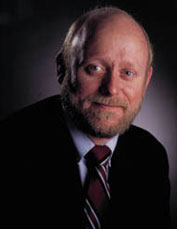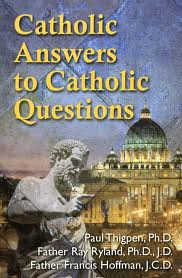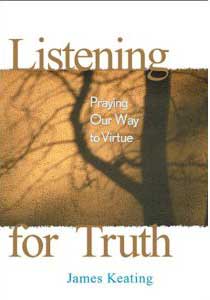USCCA27 Â Chapter 23 Â Life In Jesus part 2
[powerpress]
Archbishop Lucas offers insights on the US Catholic Catechism for Adults Chapter23:
The Understanding of Moral Acts
Another important foundation of Christian morality is the understanding of moral acts. Every moral act consists of three elements: the objective act (what we do), the subjective goal or intention (why we do the act), and the concrete situation or circumstances in which we perform the act (where, when, how, with whom, the consequences, etc.). For an individual act to be morally good, the object, or what we are doing, must be objectively good. Some acts, apart from the intention or reason for doing them, are always wrong because they go against a fundamental or basic human good that ought never to be compromised. Direct killing of the innocent, torture, and rape are examples of acts that are always wrong. Such acts are referred to as intrinsically evil acts, meaning that they are wrong in themselves, apart from the reason they are done or the circumstances surrounding them. The goal, end, or intention is the part of the moral act that lies within the person. For this reason, we say that the intention is the subjective element of the moral act. For an act to be morally good, one’s intention must be good. If we are motivated to do something by a bad intention—even something that is objectively good—our action is morally evil. It must also be recognized that a good intention cannot make a bad action (something intrinsically evil) good. We can never do something wrong or evil in order to bring about a good. This is the meaning of the saying, “the end does not justify the means†(cf. CCC, nos. 1749-1761).
United States Conference of Catholic Bishops (USCCB)
The Most Reverend George J. Lucas leads the Archdiocese of Omaha.Â
For other episodes in the visit our Archbishop George Lucas page
This programs is based on:
More information can be found here.
We wish to thank the USCCB for the permissions granted for use of  relevant material used in this series.
Also we wish to thank Matt Wilkom  for his vocal talents in this episode.
[ezcc]
Tags: acts, evil, Jesus, moral decision making, moral theology, morality, united states catholic catechism for adults, USCCB
This entry was posted on Monday, November 26th, 2012 at 7:45 am
You can follow any responses to this entry through the RSS 2.0 feed.
USCCA26 Â Chapter 23 Â Life In Jesus part 1
[powerpress]
Archbishop Lucas offers insights on the US Catholic Catechism for Adults Chapter23:
Made in the Image of God
The most basic principle of the Christian moral life is the awareness that every person bears the dignity of being made in the image of God. He has given us an immortal soul and through the gifts of intelligence and reason enables us to understand the order of things established in his creation. God has also given us a free will to seek and love what is true, good, and beautiful. Sadly, because of the Fall, we also suffer the impact of Original Sin, which darkens our minds, weakens our wills, and inclines us to sin. Baptism delivers us from Original Sin but not from its effects—especially the inclination to sin, concupiscence. Within us, then, is both the powerful surge toward the good because we are made in the image of God, and the darker impulses toward evil because of the effects of Original Sin. But we should always remember that Christ’s dying and rising offers us new life in the Spirit, whose saving grace delivers us from sin and heals sin’s damage within us. Thus we speak of the value, dignity, and goal of human life, even with its imperfections and struggles. Human life, as a profound unity of physical and spiritual dimensions, is sacred. It is distinct from all other forms of life, since it alone is imprinted with the very image of its Creator.
United States Conference of Catholic Bishops (USCCB).
The Most Reverend George J. Lucas leads the Archdiocese of Omaha.Â
For other episodes in the visit our Archbishop George Lucas page
This programs is based on:
More information can be found here.
We wish to thank the USCCB for the permissions granted for use of  relevant material used in this series.
Also we wish to thank Denise Wharton  for her vocal talents in this episode.
[ezcc]
Tags: catholic social teaching, conscience, Jesus, morality, original sin, sin, united states catechism for adults, USCCB
This entry was posted on Monday, November 19th, 2012 at 12:25 pm
You can follow any responses to this entry through the RSS 2.0 feed.
 Episode 7-Listening For Truth– Resurrection people who live out of the power of the Resurrection.  Theological virtues, faith, hope and love, are given to us in the fullest sense through the sacraments and how we receive and open our hearts to that gift.  Moving our affection from sin to truth.  How do we prepare ourselves to receive moral truth?
Episode 7-Listening For Truth– Resurrection people who live out of the power of the Resurrection.  Theological virtues, faith, hope and love, are given to us in the fullest sense through the sacraments and how we receive and open our hearts to that gift.  Moving our affection from sin to truth.  How do we prepare ourselves to receive moral truth?
[powerpress]
Deacon James Keating, PhD, the director of Theological Formation for the Institute for Priestly Formation, located at Creighton University, in Omaha, is making available to â€Discerning Hearts†and all who listen, his series of programs entitled “Listening For Truthâ€.
Listening for Truth leads men and women in a search for a fuller experience of God that begins in prayer, grows in the rediscovery of our spiritual being, and grounds itself in the truth of Jesus Christ. A presentation of the Christian life as an engagement of the whole person — body, mind, and soul — in the challenge of daily living.
For more information on the “Institute of Priestly Formation†and for other material available by Deacon Keating, just click here
Don’t forget to pickup a copy of “Communion with Christ†, it is one of the best audio sets on prayer…ever!
Check out Deacon Keating’s “Discerning Heart†page
Tags: catholic, catholic podcast, catholic prayer, cathollc spirituality, conversion, creighton university, Deacon James Keating, Deacon Keating, ethics, institute for priestly formation, moral conversion, morality, morals, Resurrection, spiritual formation, theological formation, Theological virtues, virtue
This entry was posted on Thursday, June 23rd, 2011 at 11:10 am
You can follow any responses to this entry through the RSS 2.0 feed.
Paul Thigpen is wonderful…he answers our questions about our faith not only from the head but also from the heart! More than just a proof text book, “Catholic Answers to Catholic Questions” tackles a why range of issues and questions.
from the heart! More than just a proof text book, “Catholic Answers to Catholic Questions” tackles a why range of issues and questions.
Catholic Answers to Catholic Questions provides solid answers to hundreds of common questions asked by people just like you questions both big and small regarding doctrine, history, morality, the pope, saints, the sacraments, the Mass, prayer, Scripture, and much more.
Be more confident in your faith. Allow the why to enhance the what you do as a Catholic. Make better decisions. Be more prepared to pass on your faith to others. Feed your curiosity. Author, theology professor, and Catholic apologist Paul Thigpen ensures the answe rs are not only rock-solid, but also pastoral in their approach and written in everyday, relevant language.
rs are not only rock-solid, but also pastoral in their approach and written in everyday, relevant language.
You can find this fine book here
[powerpress]
Tags: catholic, catholic answers, catholic apologist, catholic podcast, catholic prayer, cathollc spirituality, faith, morality, osv, our sunday visitor, paul thigpen, pope, sacraments, saints, scripture
This entry was posted on Friday, December 17th, 2010 at 9:07 am
You can follow any responses to this entry through the RSS 2.0 feed.





